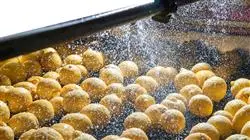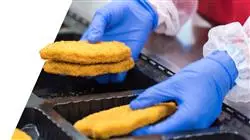University certificate
The world's largest faculty of nutrition”
Description
Thanks to this Professional master’s degree you will be up to date on the latest techniques used in risk assessment and food safety”

Improvements in food textures, taste, viscosity, nutrient stability and preservation would not be possible without the progress made in recent years by the food industry. A sector that has grown, not only thanks to consumption, but also to the demands of consumers themselves and to the control and safety measures imposed by the different regulations in force.
In food safety and quality there is a great challenge to avoid food outbreaks that could affect millions of people and spread in different countries due to the large international distribution of products. Faced with this reality, TECH has designed a program taught exclusively online, which will allow the nutrition professional to delve into advances in microbiology, new technologies applied in product development, as well as the main techniques of quality control of products.
A program where you will have a specialized faculty that will introduce you to the latest developments in the industry, viruses, prions and other foodborne biohazards, the development of microorganisms in or new techniques used in risk analysis and safety measures. For this, the professionals have multimedia resources (video summaries, videos in detail) and specialized readings that will lead them in a much more visual and dynamic way to be up to date in Food Safety Analysis and Assessment.
In addition, this university program uses the Relearningmethod, which allows students to advance in a much more natural way during the 12 months of this program, reducing even the long hours of study.
The specialists are thus faced with an excellent opportunity to obtain the most exhaustive and recent information on the Food Industry in a convenient academic format. Students only need an electronic device with an Internet connection (Computer, Tablet or mobile) to access the syllabus of this program. In addition, they have the freedom to distribute the teaching load, making it even easier to reconcile a university program with work and/or personal responsibilities.
Access to a 100% online program, without classes with timetables, designed for Nutrition professionals who wish to update their knowledge in the Food Industry”
This Professional master’s degree in Comprehensive Risk Analysis and Assessment in Food Industry contains the most complete and up-to-date scientific program on the market. The most important features include:
- The development of case studies presented by experts in the food industry
- Graphic, schematic, and practical contents with which they are created, provide scientific and practical information on the disciplines that are essential for professional practice
- Practical exercises where the self-assessment process can be carried out to improve learning
- Its special emphasis on innovative methodologies
- Theoretical lessons, questions to the expert, debate forums on controversial topics, and individual reflection assignments
- Content that is accessible from any fixed or portable device with an Internet connection
With this program you will be able to deepen in the scientific-technical advances of food and its relationship with cultural and technological progress”
The program’s teaching staff includes professionals from the sector who contribute their work experience to this educational program, as well as renowned specialists from leading societies and prestigious universities.
Its multimedia content, developed with the latest educational technology, will provide the professionals with situated and contextual learning, i.e., a simulated environment that will provide an immersive education programmed to learn in real situations.
The design of this program focuses on Problem-Based Learning, by means of which the professionals must try to solve the different professional practice situations that are presented throughout the academic course. For this purpose, the students will be assisted by an innovative interactive video system created by renowned experts.
Learn more about the mechanisms of food preservation and the prevention of microbial spoilage"

You will be able to get even closer to the progress of the sector thanks to the case studies on food safety provided in this program"
Objectives
The main goal of this Professional master’s degree is to ensure that the Nutrition professionals obtain a successful update of their knowledge in the Comprehensive Risk Analysis and Assessment in Food Industry. For this, TECH provides innovative teaching tools that will keep you up to date in microbiology, food hygiene, quality control mechanisms and traceability in the food chain and existing safety management regulations.

TECH provides you with the most innovative pedagogical tools to keep you up to date in a more dynamic way on risk assessment methods in the Food Industry”
General Objectives
- Acquire basic knowledge on epidemiology and prophylaxis
- Understand and distinguish the physicochemical parameters that affect microbial growth in food
- Identify the differential nature of acellular organisms (viruses, viroids and prions) in terms of their structure and mode of replication, with respect to eukaryotic and prokaryotic cellular models
Specific Objectives
Module 1. Fundamentals of Microbiology
- Recognize the levels of organization of prokaryotic and eukaryotic microorganisms, as well as to relate their main structures to their function
- Understand the basis of microbial pathogenicity and the defense mechanisms of the human body against existing pathogens
- Point out the main techniques and strategies for the inhibition, destruction or elimination of microbial populations
- Understand and interrelate the main mechanisms of genetic exchange in microorganisms and their application in food biotechnology
Module 2. General Chemistry
- Explain in an understandable way basic chemical phenomena and processes that interact with the environment
- Describe the structure, physicochemical properties and reactivity of elements and compounds involved in biogeochemical cycles
- Operate basic instrumentation in a chemistry laboratory
- Have the ability to interpret the results in the practical environment of chemistry
Module 3. Microbiology and Food Hygiene
- Learn the main tranfsormative, pathogenic and beneficial microorganisms in food
- Know the mechanisms of food preservation and know how to prevent microbial spoilage of food
- Know how to identify and differentiate the main elements causing foodborne pathologies: microorganisms, toxins, viruses and parasites
- Learn about the beneficial effects of microorganisms in the field of food
- Identify and understand the most important elements of a microbiology laboratory
- Evaluate the beneficial effects of microorganisms in foods
- Learn and apply techniques for the detection of microorganisms in food
Module 4. Food, technologies and culture
- Analyze the historical-cultural evolution of the transformation and consumption of foodstuffs or of specific food groups
- Relate the progress in the scientific-technical knowledge of food with cultural and technological progress
- Identify factors that influence the choice and acceptability of foods
- Recognize the role of cultural norms in food customs and regulations, as well as in the role of food in society
- Differentiate the essential characteristics of foods and branches of the food industry
- in the context of today's food
- Analyze trends in food production and consumption
Module 5. Biochemistry and Food Chemistry
- Know, understand and use the principles of chemical and biochemical reactions of foods in an appropriate professional context
- Identify and use the principles of food components and their physicochemical, nutritional, functional and sensory properties
- Acquire skills and abilities in food analysis
- Ability to identify the problems associated with different foods and their processing, the different technological processes together with the transformations that the products may undergo during these processes
Module 6. Food and Public Health
- To know the distinguishing fact of human nutrition, interrelationships between nature and culture
- Acquire a good understanding of individual and social eating behaviors
- Know the fundamentals and general systems of disease prevention, health promotion and protection, as well as the etiologies and epidemiological factors relating to foodborne diseases
- Identify health problems associated with the use of food additives
- Appreciate and recognize the sanitary and preventive importance of cleaning, disinfection, disinsecting and pest control programs in the food chain
- Classify the main social and economic implications of zoonoses
Module 7. Analysis and Quality Control
- Recognize food components and their physicochemical, nutritional, functional and sensory properties
- Acquire and apply skills and abilities in food analysis during professional practice
- Develop and apply quality control and traceability mechanisms in the food chain
- Design and develop experimental tests to evaluate food and food processes
- Understand the bases and principles of the methods used for quality control and food authenticity
Module 8. Food Industry
- Controlling and optimizing processes and products in the food industry. Manufacturing and preserving foodstuffs
- Develop new processes and products
- Understand the industrial processes of food processing and preservation, as well as packaging and storage technologies
- Discover the transformation and preservation processes particular to the main types of food industries
- Identify the process and product control and optimization systems applied to the main types of food industries
- Apply the knowledge of transformation and preservation processes to the development of new processes and products
Module 9. Risk Analysis in the Food Industry
- Knowing the factors that influence microbial growth in different foods for human consumption
- Identify, analyze and evaluate the biological, chemical and physical hazards that can occur during all stages of the food chain
- Identify the main microorganisms and parasites responsible for foodborne diseases
- Understand and recognize the public health significance of foodborne diseases and the control measures applicable in each case
- Understand how to apply available web resources to search for information related to food safety management and assessment
Module 10. Quality and Food Safety Management
- Identify and interpret the requirements of the food safety management standard (UNE EN ISO 22000) for its subsequent application and evaluation in food chain operators
- Develop, implement, evaluate and maintain appropriate hygiene practices, food safety and risk control systems
- Participate in the design, organization and management of different food services
- Collaborate in the implementation of quality systems
- Evaluate, control and manage aspects of traceability in the food supply chain
- Contribute towards consumer protection within the framework of food safety and quality

You will be able to refresh your knowledge on food safety risk assessment and control processes thanks to this TECH program”
Professional Master's Degree in Comprehensive Risk Analysis and Assessment in the Food Industry.
Nowadays, food safety is a growing concern worldwide. Companies in the food industry face risks that can affect the quality and safety of their products, which in turn can have serious consequences for public health and for the company's reputation. That is why food risk management has become a priority for many companies. To address this need, TECH Global University has developed the Professional Master's Degree in Comprehensive Risk Analysis and Assessment in the Food Industry. An online educational program that allows you to specialize in food risk management. It focuses on risk analysis techniques and crisis management in case of food emergencies. In addition, the program includes a module dedicated to food risk communication, which is essential for proper food risk management.
The master's degree offered by TECH is highly valued by employers in the food industry. In addition, it provides the flexibility to study at your own pace from anywhere with internet access, allowing you to access content and resources at any time and from anywhere. This is especially advantageous for those who have complicated schedules or who cannot attend classes in person. Thus, they will be able to follow the program at their own pace and adapt to their needs. This program will provide you with the skills and knowledge necessary to deal with the risks associated with food production, processing and distribution, and will allow you to advance your career in the food industry. Take advantage of this great opportunity and take your career to the next level with TECH!







